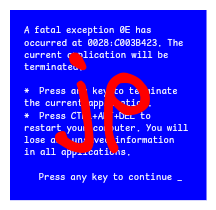- cross-posted to:
- programmerhumor@lemmy.ml
- cross-posted to:
- programmerhumor@lemmy.ml
also applies to unix vs dos
When you migrate the filesystem from a windows to Linux installation and hours later you can’t find anything

\o/
Ohhhhh… I fucking hate this. I use Windows locally, but I do support for a render farm that runs on Linux. The number of times I have recieved “it works locally” tickets from an artist who decided to get clever and embed Windows paths in string literals in their scene makes me want to punch a puppy. They don’t even look at the application logs we provide to see that the paths threw errors. We handle repointing their file paths with symlinks normally, but when they use literals it literally fucks the system with escapes. I will never understand why Microsoft refuses to standardize to POSIX with the rest of the world. Aside from them being a US company with decision makers who still think freedom units make sense.
Why fight when you can just do
cd /mnt/c/Program\ Files\ \(x86\)/Shouldn’t the blade be green? I thought Luke wore all black in ROTJ when he got hos green lightsaber.
I hate that I need to use escape characters when creating something for windows.
Python raw strings to the rescue!
Pathlib is the answer.
Nobody is stopping you from using forward slashes. Python will translate the path for the current platform.
Python doesn’t have to. Windows supports both out of the box. Has been for many, many years
Good to know!
Try pathlib. All your problems solved.
Would it be more efficient to say Unix vs Windows?
You mean right vs. wrong?
Posix
I thougt linux is no longer Posix compliant, or is just partially posix compliant.
It was never fully compliant. POSIX threads, in particular, are a long time sticking point on Linux.
Is there any OS that’s fully POSIX-compliant?
Yes, in fact, there’s a formal certification process by the IEEE and the Open Group.
https://en.wikipedia.org/wiki/POSIX#POSIX-oriented_operating_systems
Mind you, I think only one of the fully-certified OSen has any substantial use these days (MacOS X). People tend to overvalue it, IMO.
Thank you for educating this dumbass.
I’d just like to interject for a moment. What you’re refering to as Linux, is in fact, GNU/Linux, or as I’ve recently taken to calling it, GNU plus Linux. Linux is not an operating system unto itself, but rather another free component of a fully functioning GNU system made useful by the GNU corelibs, shell utilities and vital system components comprising a full OS as defined by POSIX.
Many computer users run a modified version of the GNU system every day, without realizing it. Through a peculiar turn of events, the version of GNU which is widely used today is often called Linux, and many of its users are not aware that it is basically the GNU system, developed by the GNU Project.
There really is a Linux, and these people are using it, but it is just a part of the system they use. Linux is the kernel: the program in the system that allocates the machine’s resources to the other programs that you run. The kernel is an essential part of an operating system, but useless by itself; it can only function in the context of a complete operating system. Linux is normally used in combination with the GNU operating system: the whole system is basically GNU with Linux added, or GNU/Linux. All the so-called Linux distributions are really distributions of GNU/Linux!
No, Richard, it’s ‘Linux’, not ‘GNU/Linux’. The most important contributions that the FSF made to Linux were the creation of the GPL and the GCC compiler. Those are fine and inspired products. GCC is a monumental achievement and has earned you, RMS, and the Free Software Foundation countless kudos and much appreciation.
Following are some reasons for you to mull over, including some already answered in your FAQ.
One guy, Linus Torvalds, used GCC to make his operating system (yes, Linux is an OS – more on this later). He named it ‘Linux’ with a little help from his friends. Why doesn’t he call it GNU/Linux? Because he wrote it, with more help from his friends, not you. You named your stuff, I named my stuff – including the software I wrote using GCC – and Linus named his stuff. The proper name is Linux because Linus Torvalds says so. Linus has spoken. Accept his authority. To do otherwise is to become a nag. You don’t want to be known as a nag, do you?
(An operating system) != (a distribution). Linux is an operating system. By my definition, an operating system is that software which provides and limits access to hardware resources on a computer. That definition applies whereever you see Linux in use. However, Linux is usually distributed with a collection of utilities and applications to make it easily configurable as a desktop system, a server, a development box, or a graphics workstation, or whatever the user needs. In such a configuration, we have a Linux (based) distribution. Therein lies your strongest argument for the unwieldy title ‘GNU/Linux’ (when said bundled software is largely from the FSF). Go bug the distribution makers on that one. Take your beef to Red Hat, Mandrake, and Slackware. At least there you have an argument. Linux alone is an operating system that can be used in various applications without any GNU software whatsoever. Embedded applications come to mind as an obvious example.
Next, even if we limit the GNU/Linux title to the GNU-based Linux distributions, we run into another obvious problem. XFree86 may well be more important to a particular Linux installation than the sum of all the GNU contributions. More properly, shouldn’t the distribution be called XFree86/Linux? Or, at a minimum, XFree86/GNU/Linux? Of course, it would be rather arbitrary to draw the line there when many other fine contributions go unlisted. Yes, I know you’ve heard this one before. Get used to it. You’ll keep hearing it until you can cleanly counter it.
You seem to like the lines-of-code metric. There are many lines of GNU code in a typical Linux distribution. You seem to suggest that (more LOC) == (more important). However, I submit to you that raw LOC numbers do not directly correlate with importance. I would suggest that clock cycles spent on code is a better metric. For example, if my system spends 90% of its time executing XFree86 code, XFree86 is probably the single most important collection of code on my system. Even if I loaded ten times as many lines of useless bloatware on my system and I never excuted that bloatware, it certainly isn’t more important code than XFree86. Obviously, this metric isn’t perfect either, but LOC really, really sucks. Please refrain from using it ever again in supporting any argument.
Last, I’d like to point out that we Linux and GNU users shouldn’t be fighting among ourselves over naming other people’s software. But what the heck, I’m in a bad mood now. I think I’m feeling sufficiently obnoxious to make the point that GCC is so very famous and, yes, so very useful only because Linux was developed. In a show of proper respect and gratitude, shouldn’t you and everyone refer to GCC as ‘the Linux compiler’? Or at least, ‘Linux GCC’? Seriously, where would your masterpiece be without Linux? Languishing with the HURD?
If there is a moral buried in this rant, maybe it is this:
Be grateful for your abilities and your incredible success and your considerable fame. Continue to use that success and fame for good, not evil. Also, be especially grateful for Linux’ huge contribution to that success. You, RMS, the Free Software Foundation, and GNU software have reached their current high profiles largely on the back of Linux. You have changed the world. Now, go forth and don’t be a nag.
Thanks for listening.
There are several linux systems that don’t use GNU. Android for one. Alpine (everyone’s favorite docker image) for two. ChromeOS for three.
The number of times I had to ask “how can I tell where the file ‘physically’” (I know) “lives” on the network when I took up work at a Windows shop, it was just baffling. And Win people couldn’t understand what I was asking.
There’s a location for this effing thing. I want to know where it is, really! How do I get that info?!
It’s not Win people. It is dumb people.
Any Infrastructure IT guy can tell you where specific files are stored, it is their job. Whether they mainly use Windows, Mac or Linux doesn’t matter.
Physically, it’s probably on your hdd or ssd. Or possibly just in ram or a data center somewhere 😜
File systems aren’t even real.
What is this “real” concept anyway?
Adam Savage famously stated on Mythbusters “I reject your reality and substitute my own”
Sure, but is reality even real then? Is anything real?
Not that I meant to get all pop-philosophical on this beautiful Sunday morning, sorry about that.
I, too, first heard this quote from Adam on Mythbusters as a child. But, I’m pretty sure I also heard it was said first by some philosopher.
I would later be informed that “some philosopher” was the 1984 film The Dungeon Master.
Only apparently that was not the first, and it was said in a 1974 episode of Doctor Who. Well, someone on Reddit said that, and linked to this WikiQuote page but on that page it also says it’s from The Dungeon master.
So, I don’t know what to believe any more, and I still hope it was actually an obscure lost quote of Rene Magritte or something because in my head it would just make sense.
I only know this because of SAO Abridged.
at that point operating systems are also not real.
Wait, are we real?
Both works fine in Windows tho?
Used to not
In Linux it is still not.
Actually, from what I can tell in my brief 15-minute internet search, every version of Windows since NT has accepted both because DOS 2.0 supported both. The exception to this was Command Prompt. But, these days, it supports both. Not sure when they made that change in Command Prompt, but I think it’s been that way since at least Windows 7.
Sadly, I had the great displeasure of writing code for Windows (and DOS) well before then.
Times change. You used to not be able to run Linux in Windows, but you can do that too.
Yeah, and I’ve tried that. It turns out it works even better if you throw away the Windows part.
Thanks be to God
If you know what a nordic keyboard layout looks like, you’d probably prefer backslash. Since I moved to Linux a year ago I’ve been struggling to find the easiest way to forward slash. Shift + 7? Or numpad / with my right pinky?
Shift + 7? Or numpad / with my right pinky?
Yes.
Had a similar struggle with the German layout, but in the meantime I have moved to the “EURKey” layout. It is built in to many distros and available for Windows and Mac. It mimics a US layout while still having all the äüöß (and much more) I could ever need. Though I will say it’s only really worth it if you’re in IT or similar where you frequently need certain symbols.
That’s not a bad shout at all. It does hide æøå on weird keys though, would take a lot of practice to get used to that, but I’ll definitely put that layout into the layout rotation, thanks for the suggestion.
Get a macro pad and configure one button to type a forward slash.
How do you type URLs using that keyboard layout?
Shift+7 feels wrong for some reason, so I currently tend to just send my pinky on a kamikaze mission towards the numpad hoping I hit /. Sometimes I hit numlock, sometimes I hit *.
Even if I made a compose key “shortcut” via ~/.XCompose it’d still be more work than what I’m doing already.Macro pad could be a solution, I have considered it beforehand for other purposes tbh
For me it’s even worse. Forward slash is also Shift + 7 and backslash is AltGr + ß?? I hate that computing is only optimized for US american layouts. Going by my keyboard, the filepath separator should probably be an ö.
This meme is way more clever than it should be
Took me a minute
Can you please explain? I’ve never used Mac and it’s been a long time since I’ve properly used windows.
The lightsaber orientation is the same as the slash orientation
Ha, neat!
File paths in Linux and Mac use / while Windows uses \
Take a look at the angle of the lightsabers.
I never would’ve gotten that!
Like I said, way more clever than it should be. Props to the creator for sure.
Technically, Windows understands both / and \. I personally always use / just because it’s easier to type that.
Didn’t realize until I read your comment. Thanks.
I didn’t realise until I read that comment, your comment and the other comment about slash direction.
I realized immediately, read the comment, and then went back to look for a deeper meaning. It wasn’t there.
JFC, thank you. I didn’t realize until it was spelled out for me. I’m definitely not that kind of smart.
This is why I always sucked at games like Myst
Myst and Riven are two of my favorite games of all time. Give Myst another go if you’ve never finished it. After you complete the game, you unlock the “making of Myst” videos. The red and blue brothers in the videos are the two creators. They were independent developers in the 90s, so they made do with what they had. At one point they shove a rubber hose into a toilet to make the atmospheric bubbling sounds.
It’s a beautiful, clever, and groundbreaking game. Its puzzles, however, are taken in game design as an example of what not to do.
The clocktower combination puzzle, in particular, still makes me angry.
It’s not something the Jedi would tell you.
Only a sith deals in absolute paths.
It’s the way.
Also the internet belongs on the left.
And really, Linux/macos could be reduced to “Unix” https://upload.wikimedia.org/wikipedia/commons/7/77/Unix_history-simple.svg
Also the internet belongs on the left
This rings true in more ways than one.
I mean literally… example.com**/**index.html
Only Mac OS 10 and later, based on BSD, uses ‘/‘. (And, I guess, A/UX.) Classic MacOS used a ‘:’, but it wasn’t regularly exposed in the UI. The only way most users would know is that the colon couldn’t be used in a file name.
I might be wrong, but I think you still can’t use a ‘:’ in a filename in macOS. If I recall correctly it will let you do it and show it in Finder, but actually replace it with a ‘-’.
And BSD. It’s really just Windows vs. literally everything. Or is there anything else that uses backslashes?
CP/M
Which in this context is named hilariously.
Typical windows behavior
I don’t get it
The lightsaber direction is like / \
Linux uses forward slash. Windows uses backslash. Because some dude 45 years ago wanted to make it look different from UNIX.
Was that bill gates just to make one of the first incompatibilities in a long long run?
DOS originally didn’t even support directories but was using / for command line arguments. They didn’t want to change the option character and break stuff so they went with \ as the directory separator.
DOS wasn’t originally created by Microsoft. They bought the OS from computer shop in Seattle.
Thanks for the info, didn’t know that (I did know they bought DOS)!
This is a great video about the launch of Windows 95, that covers the history of DOS at the beginning: https://youtu.be/0Ol8ZSE-PEk. Worth watching if you’re interested in the history.
I understand pre-OS X Macintoshes used colons.
They did! And I weirdly kind of miss them for the entirely non-logical reason that they looked elegant.
Don’t get me wrong, I adapted in about 3 seconds when I made the switch to Mac OS X 25 years ago, but I irrationally kinda miss them just a tiny bit.
Code in Rust and you can get double colons for your library path imports!
RISC OS uses periods and doesn’t have file extensions



















